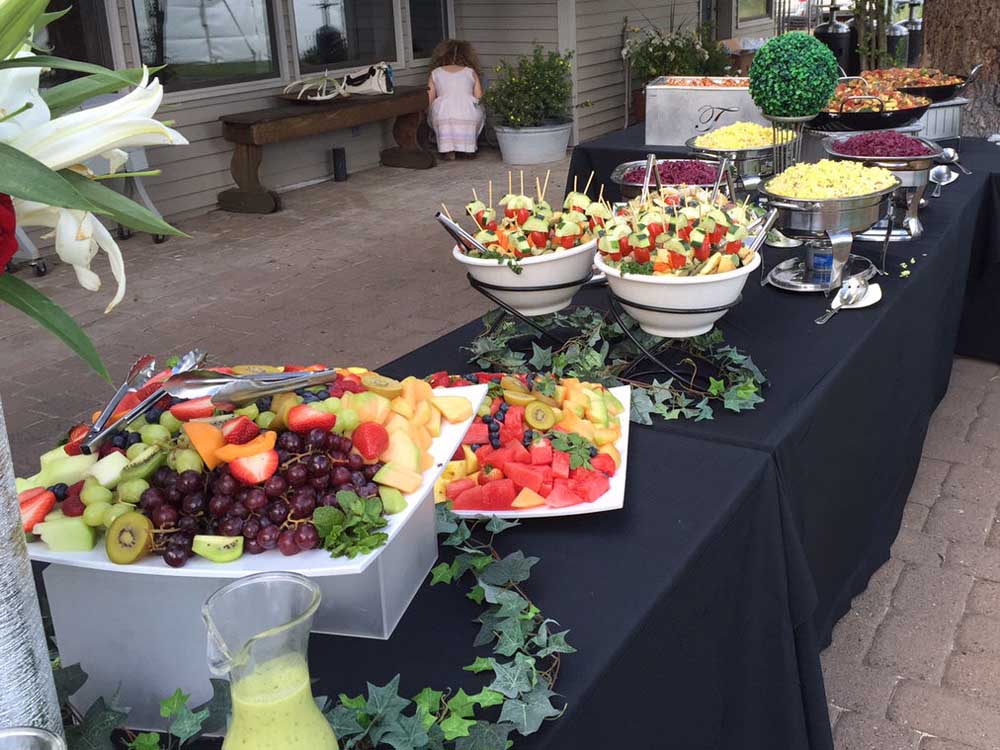How to cater festive affairs
Published 12:00 am Tuesday, December 8, 2015

- Tate and Tate Submitted photo
Parties are always fun, but they can be overwhelming — especially if you have to do all the work yourself.
Whether you’re looking to host a special dinner for friends or a wedding reception for 500, the stress can be greatly reduced if you have an experienced caterer to help.
What, exactly, can a caterer do for you?
The most obvious function is to plan and prepare the food for your event. It doesn’t matter if it’s a country barbecue on the patio or a formal sit-down dinner at a trendy venue, there’s a caterer who can make your life a lot easier.
In addition to the food prep, many caterers can handle all the meal service and supplies needed for the event. If it’s a buffet, they can supply the warming trays to keep food at optimal serving temperatures. They can also bring in glasses, dishes and other serving utensils and handle trash disposal.
For more formal events, some caterers can supply tables and chairs, linens, glasses and dinnerware. They’ll even set the table for you, including centerpieces. And, of course, the catering staff can plate and serve the food to your guests and clean up the kitchen.
But these miracle workers do come at a price, and that depends greatly on the details and exactly how much you want them to do.
In the beginning
The initial task of finding a caterer can be daunting, particularly if you’ve never used one before. Check with friends and colleagues who may have used a caterer and ask for recommendations. In the case of a wedding reception, ask the venue wedding planner for assistance.
Read reviews on social media and look at the caterer’s website for the type of events they’ve serviced and menu options. Look for photo galleries of previous events they’ve done.
Availability is key, and caterers are very busy at certain times of the year, including Thanksgiving, Christmas and traditional wedding months such as June. They’re also usually busier on the weekends than during the week. So the earlier you set your event date, the better chance you’ll have of getting the caterer you want.
Although much work can be done online, it’s best to initially meet with the caterers. Get a feel for their business and how they can help you. And be prepared to discuss exactly what you want them to do. Not every caterer might be a match for your needs — some specialize in larger group events, others might do only weddings and some might have limited menu or location options, etc.
Catering isn’t an all-or-none service — you can do all the party prep yourself and simply let a caterer supply the food, or you can do virtually nothing beyond sharing in the planning and let the caterer handle all the day’s arrangements. It’s up to how you want to be involved and, ultimately, how much you want to spend.
Information exchange
Know any restrictions placed on you by the place you’re holding the event if it isn’t your home. For example, if you’re hosting a holiday party for employees at a hotel, they might have policies requiring catering only by in-house staff. Also check any policies regarding the use of alcohol — the church meeting hall might frown upon the inclusion of craft beer at your party.
It’s also helpful to know what the venue can supply for your event that the caterer can use. For example, some places will supply dishes, cups, table linens, etc., so your caterer doesn’t have to deal with those items and can simply concentrate on the food. If the party’s at your home, check that you have a sufficient quantity of serving pieces (utensils, plates, glasses, etc.) on hand for the crowd.
One important bit of information to discuss early on is the budget for your event. Many caterers offer menu pricing on their websites so you can get a realistic idea of food costs. But that might not be the total you need to consider. Many caterers price additional services separately, such as alcohol, serving fees, rental of tables, chairs, china and delivery/pickup costs. Offering a budget range will allow the caterer to give you a realistic picture of what’s possible for your celebration.
Offer your caterer a vision for the food you’d like. If there are any restrictions, speak up. For example, if you want all the food to be locally sourced, organic or vegetarian. Often there is an upcharge for those types of requests. For example, Bend’s Bleu Bite Catering charges 20 percent more to provide organic food.
Have an open exchange about the food service and listen to recommendations that could save you money. For example, anykitchen.net points out food costs for a seated dinner are often less per person than for a buffet, as there’s a finite quantity of food being served. On the other hand, the site notes that there’s less flexibility than a buffet offering when you might have a fluctuating number of people (those who didn’t RSVP, no-shows, etc.).
Caterers are experienced with cooking for crowds, and they know, for example, the average number of cocktail meatballs a guest will consume. But if you’re serving an appetizer-only event at 6 p.m., some guests might consider it to be dinner, and if it’s the high school football team, there might need to be an adjustment to the food quantity, so be sure your caterer knows the audience, as well as the timing of your get-together.
Not all food options are possible for every event. For example, serving ice cream to 300 people at an outdoor event in July is a herculean task many caterers will not take on, as there will literally be a meltdown. Ask your caterer for options if you have your heart set on something that they deem unworkable.
Drink up
Alcohol can drive up the cost of an event by leaps and bounds, so discuss options. In most instances, it’s less expensive to purchase your own beverages than to let the caterer handle drinks. But if you do choose to let them provide drinks, keep in mind that beer and wine are more reasonable than specialty cocktails, which require the services of a bartender. Always be sure to offer nonalcoholic options as well.
Scheduling
Caterers often host multiple events on the same day, so be sure to nail down the timing details — what time the caterer will arrive and what time they expect to leave — to help solidify the party plans. If you need to return serving equipment, note when it’s due back to avoid additional charges.
Ask your caterer what happens to the leftovers. As the host of the event, do you get to keep them? If so, will they be packaged for you?
Payment
When you sign a contract with a caterer, there’s an initial deposit to reserve its services, and the remainder might be due prior to the event. Inquire about how payment can be made.
If charges are per person, ask about a fudge factor in case extra people come or there are no-shows. There may be upcharges for smaller groups than planned for, and some caterers will not service events without a minimum number of attendees.
Don’t forget that a gratuity for the catering staff is a nice touch after they’ve helped you with a great event.
Ongoing communication
After all the initial arrangements are agreed upon, it’s very important to keep in contact with your caterer and inform them of any changes prior to the event. This might include an increase or decrease in the number of guests, any change in venue or policies affecting outside service providers or newly discovered food allergies.
Takeout
If you really don’t need the full-service offerings of an on-site caterer, consider letting them help you out by simply providing the food. Most caterers will prepare food in quantity and you simply go by and pick it up, or for an additional fee, they will deliver it to you. Serve it as is or transfer the food to your own serving containers. Tate and Tate Catering offers this option in both the Bend NorthWest Crossing location and in Redmond at the company’s retail location. Order ahead if you need a large quantity or something specific, or choose from the regular menu options.
Personal service
Those short on time or interest in cooking might also want to consider the services of a personal chef, such as Bette Fraser of The Well Traveled Fork. Someone will grocery shop and prepare meals for you at your home, and all you have to do is savor the goodness. Quantities of meals can also be made ahead and frozen for later use.
— Reporter: gwizdesigns@aol.com






